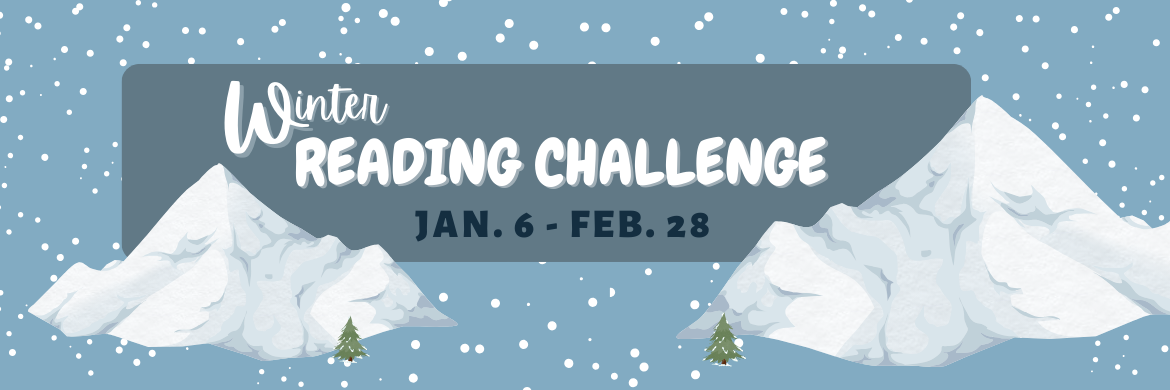Upcoming Events
The Teen Advisory Council is made up of teens from local middle and high schools who advise the Public Experiences staff staff on all things teen at the library.
Looking for a way to stay warm this winter? Get busy building with blocks, magna tiles, Legos and more! Best for ages 0-6.
Designed for ages 10-24 months, this 30 minute storytime features stories, singing, exploring and play. Prepare for lots of movement and laughter!
Designed for ages 10-24 months, this 30 minute storytime features stories, singing, exploring and play. Prepare for lots of movement and laughter!
The Western Region for Economic Assistance (WREA) from La Crosse County Economic Assistance will provide services on Wednesdays from 11-1 pm in the Library study room on the second floor. WREA staff members will be available to help communit
Designed for ages birth-9 months, this 20 minute storytime features simple stories, songs, rhymes, and a lot of interactive fun! A great opportunity to meet other caregivers in the area with playtime happening after storytime.
Join us for a screening of a recently released film! Movies will be shown in the Auditorium on the large projection screen. Free popcorn!
Twisters (2024)
Bring your favorite book and read aloud to a friendly, trained therapy dog! Build confidence, improve reading skills, and have fun at North Library. Perfect for all young readers!
Anime fans join us for screenings of your favorite series! Themed snacks provided. Hang out with other fans and join in on the fun! Best for grades 6-12.
Celebrating Native American Heritage
-
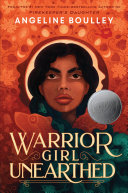
Warrior Girl Unearthed
An Instant New York Times bestseller!
A #1 Indies Bestseller!
A Publisher's Lunch Best YA of 2023!
An Amazon Best Book of the Year!
Winner of the Boston Globe–Horn Book Award!
A Horn Book Fanfare Title!
A BookPage Best Book of the Year!
An Indigo Teen Staff Pick of the Month!
An Indie Next Pick!
FIVE STARRED REVIEWS FOR WARRIOR GIRL UNEARTHED!
#1 New York Times bestselling author of Firekeeper's Daughter Angeline Boulley takes us back to Sugar Island in this high-stakes thriller about the power of discovering your stolen history.
Perry Firekeeper-Birch has always known who she is - the laidback twin, the troublemaker, the best fisher on Sugar Island. Her aspirations won't ever take her far from home, and she wouldn't have it any other way. But as the rising number of missing Indigenous women starts circling closer to home, as her family becomes embroiled in a high-profile murder investigation, and as greedy grave robbers seek to profit off of what belongs to her Anishinaabe tribe, Perry begins to question everything.
In order to reclaim this inheritance for her people, Perry has no choice but to take matters into her own hands. She can only count on her friends and allies, including her overachieving twin and a charming new boy in town with unwavering morals. Old rivalries, sister secrets, and botched heists cannot - will not - stop her from uncovering the mystery before the ancestors and missing women are lost forever.
Sometimes, the truth shouldn't stay buried.
Pick this up if you love:
● high stakes heist
● will-they-won't-they romance
● family secrets spanning decades -
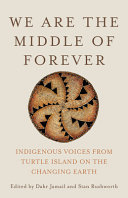
We are the Middle of Forever
An American Library Association Notable Book
A powerful, intimate collection of conversations with Indigenous Americans on the climate crisis and the Earth's futureAlthough for a great many people, the human impact on the Earth--countless species becoming extinct, pandemics claiming millions of lives, and climate crisis causing worldwide social and environmental upheaval--was not apparent until recently, this is not the case for all people or cultures. For the Indigenous people of the world, radical alteration of the planet, and of life itself, is a story that is many generations long. They have had to adapt, to persevere, and to be courageous and resourceful in the face of genocide and destruction--and their experience has given them a unique understanding of civilizational devastation.
An innovative work of research and reportage, We Are the Middle of Forever places Indigenous voices at the center of conversations about today's environmental crisis. The book draws on interviews with people from different North American Indigenous cultures and communities, generations, and geographic regions, who share their knowledge and experience, their questions, their observations, and their dreams of maintaining the best relationship possible to all of life. A welcome antidote to the despair arising from the climate crisis, We Are the Middle of Forever brings to the forefront the perspectives of those who have long been attuned to climate change and will be an indispensable aid to those looking for new and different ideas and responses to the challenges we face.
-
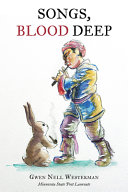
Songs, Blood Deep
*FINALIST, 2024 Minnesota Book Awards
"The poems are quiet and powerful, understated and deeply moving."--Carter Revard, author of How the Songs Come Down: New & Selected Poems
What flows deep from the heart songs of
these poems is Gwen Westerman's proud and profound engagement with and
transmission of closely held cultural values of the Dakota people.
Originating from the prairies of the Great Plains, this is a
collection that affirms a passion for family, community, and the
environment. Westerman draws upon both English and the Dakota
language to celebrate the survival of her people and articulate the
conflicts of the past and present, so that an enriched future will
endure. The long opening poem reclaims the Mississippi River as a sacred resource, "In the beginning/de Dakota Makoce/this was a Dakota place./The water was pure." Historical
misinformation about the First Peoples is unmasked, the record set
straight apart from how explorers and conquering armies have wrongly
portrayed the past. Herein life-affirming words are
conveyed from grandmother, to mother, to children and offered as a
gift to the reader, "This is my give-away--to touch what is good in you/with words your heart can hear."
-
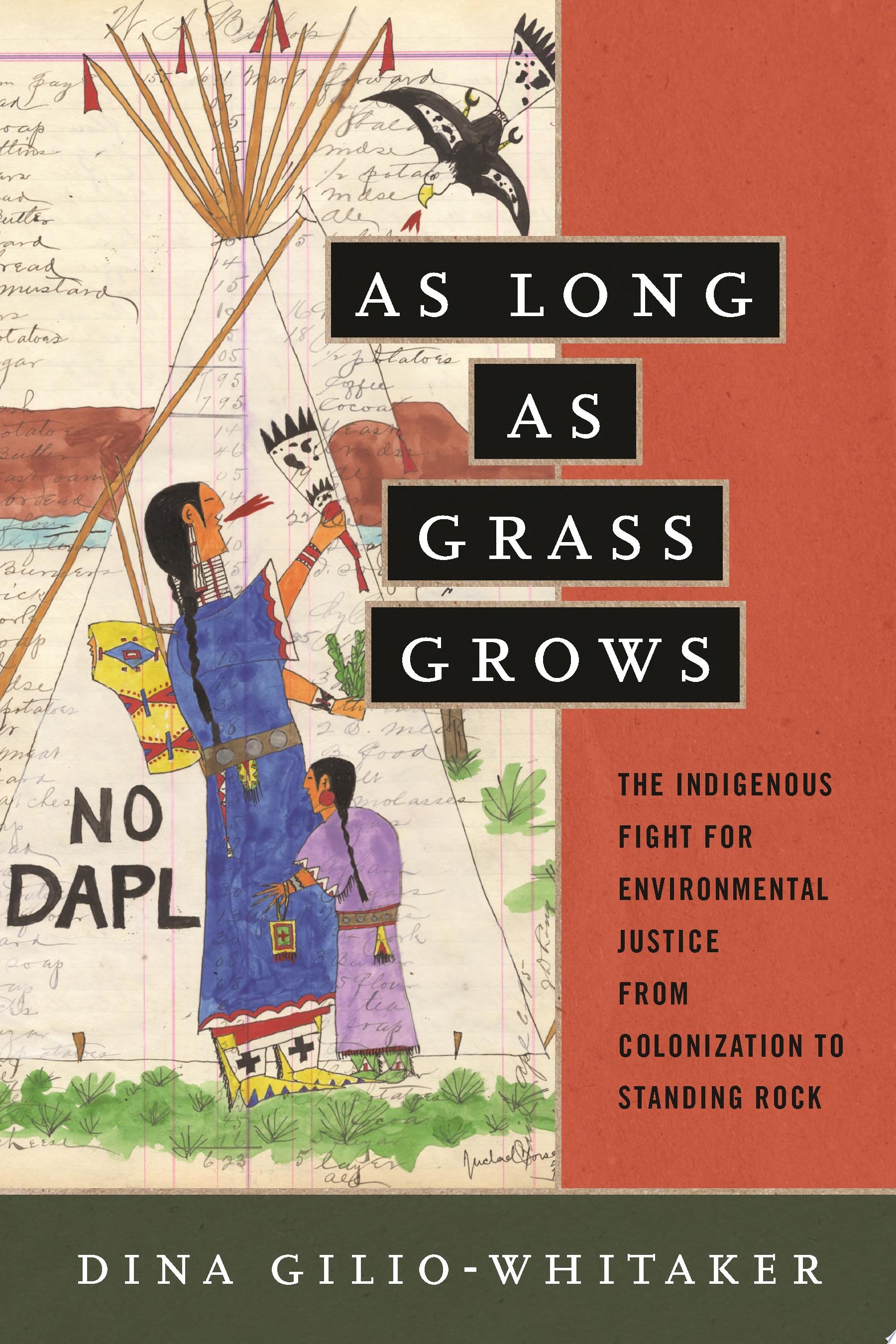
As Long as Grass Grows
The story of Native peoples’ resistance to environmental injustice and land incursions, and a call for environmentalists to learn from the Indigenous community’s rich history of activism
Through the unique lens of “Indigenized environmental justice,” Indigenous researcher and activist Dina Gilio-Whitaker explores the fraught history of treaty violations, struggles for food and water security, and protection of sacred sites, while highlighting the important leadership of Indigenous women in this centuries-long struggle. As Long As Grass Grows gives readers an accessible history of Indigenous resistance to government and corporate incursions on their lands and offers new approaches to environmental justice activism and policy.
Throughout 2016, the Standing Rock protest put a national spotlight on Indigenous activists, but it also underscored how little Americans know about the longtime historical tensions between Native peoples and the mainstream environmental movement. Ultimately, she argues, modern environmentalists must look to the history of Indigenous resistance for wisdom and inspiration in our common fight for a just and sustainable future. -
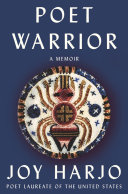
Poet Warrior
National bestseller
An ALA Notable Book
Three-term poet laureate Joy Harjo offers a vivid, lyrical, and inspiring call for love and justice in this contemplation of her trailblazing life.
Joy Harjo, the first Native American to serve as U.S. poet laureate, invites us to travel along the heartaches, losses, and humble realizations of her "poet-warrior" road. A musical, kaleidoscopic, and wise follow-up to Crazy Brave, Poet Warrior reveals how Harjo came to write poetry of compassion and healing, poetry with the power to unearth the truth and demand justice.
Harjo listens to stories of ancestors and family, the poetry and music that she first encountered as a child, and the messengers of a changing earth—owls heralding grief, resilient desert plants, and a smooth green snake curled up in surprise. She celebrates the influences that shaped her poetry, among them Audre Lorde, N. Scott Momaday, Walt Whitman, Muscogee stomp dance call-and-response, Navajo horse songs, rain, and sunrise. In absorbing, incantatory prose, Harjo grieves at the loss of her mother, reckons with the theft of her ancestral homeland, and sheds light on the rituals that nourish her as an artist, mother, wife, and community member.
Moving fluidly between prose, song, and poetry, Harjo recounts a luminous journey of becoming, a spiritual map that will help us all find home. Poet Warrior sings with the jazz, blues, tenderness, and bravery that we know as distinctly Joy Harjo.
-
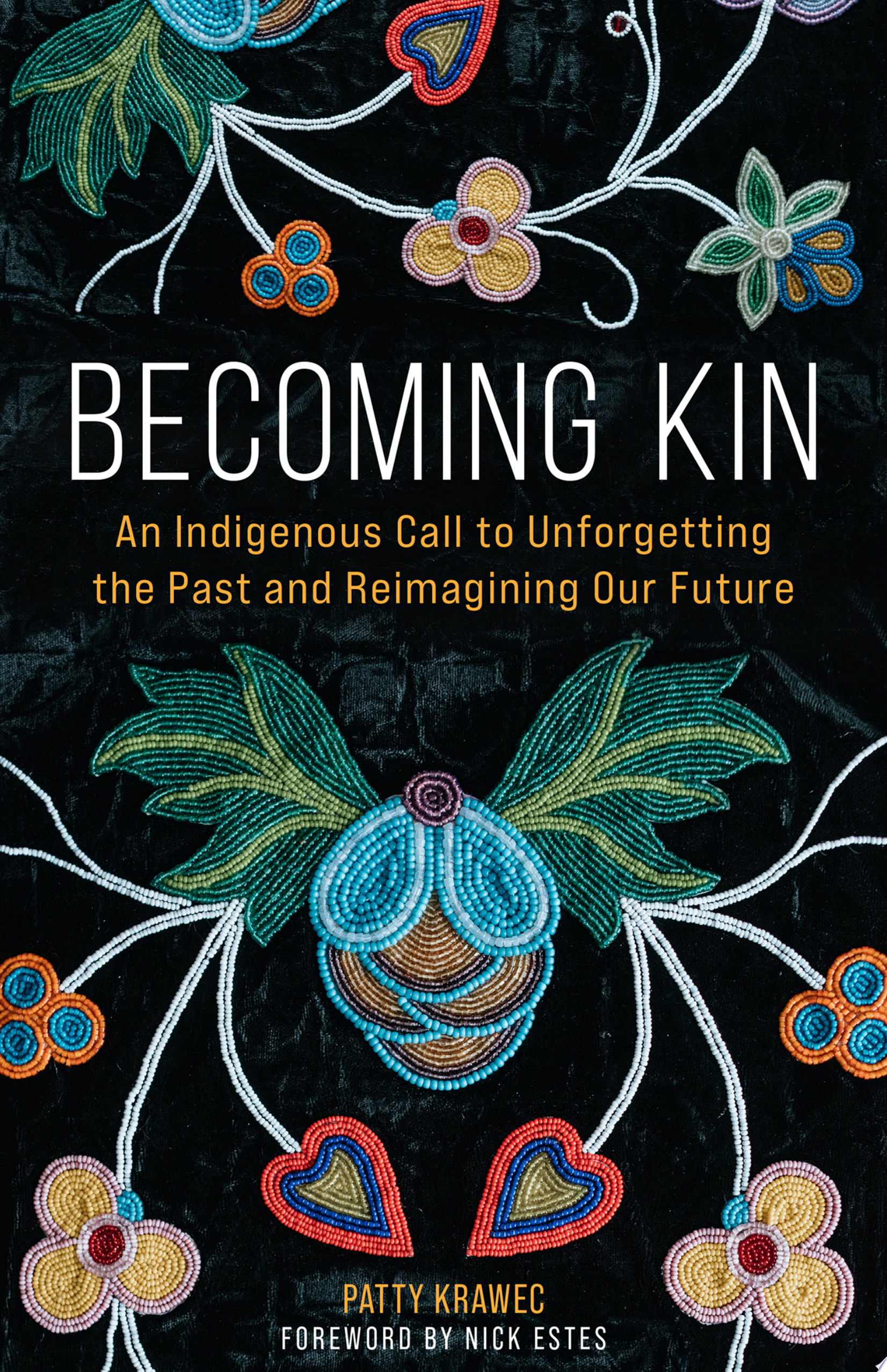
Becoming Kin
We find our way forward by going back.
The invented history of the Western world is crumbling fast, Anishinaabe writer Patty Krawec says, but we can still honor the bonds between us. Settlers dominated and divided, but Indigenous peoples won't just send them all "home."
Weaving her own story with the story of her ancestors and with the broader themes of creation, replacement, and disappearance, Krawec helps readers see settler colonialism through the eyes of an Indigenous writer. Settler colonialism tried to force us into one particular way of living, but the old ways of kinship can help us imagine a different future. Krawec asks, What would it look like to remember that we are all related? How might we become better relatives to the land, to one another, and to Indigenous movements for solidarity? Braiding together historical, scientific, and cultural analysis, Indigenous ways of knowing, and the vivid threads of communal memory, Krawec crafts a stunning, forceful call to "unforget" our history.
This remarkable sojourn through Native and settler history, myth, identity, and spirituality helps us retrace our steps and pick up what was lost along the way: chances to honor rather than violate treaties, to see the land as a relative rather than a resource, and to unravel the history we have been taught.
-
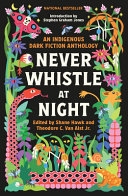
Never Whistle at Night
"
A bold, clever, and sublimely sinister collection that dares to ask the question: "Are you ready to be un-settled?"
Featuring stories by:
Norris Black - Amber Blaeser-Wardzala - Phoenix Boudreau - Cherie Dimaline - Carson Faust - Kelli Jo Ford - Kate Hart - Shane Hawk - Brandon Hobson - Darcie Little Badger - Conley Lyons - Nick Medina - Tiffany Morris - Tommy Orange - Mona Susan Power - Marcie R. Rendon - Waubgeshig Rice - Rebecca Roanhorse - Andrea L. Rogers - Morgan Talty - D.H. Trujillo - Theodore C. Van Alst Jr. - Richard Van Camp - David Heska Wanbli Weiden - Royce K. Young Wolf - Mathilda Zeller
Many Indigenous people believe that one should never whistle at night. This belief takes many forms: for instance, Native Hawaiians believe it summons the Hukai'po, the spirits of ancient warriors, and Native Mexicans say it calls Lechuza, a witch that can transform into an owl. But what all these legends hold in common is the certainty that whistling at night can cause evil spirits to appear--and even follow you home.
These wholly original and shiver-inducing tales introduce readers to ghosts, curses, hauntings, monstrous creatures, complex family legacies, desperate deeds, and chilling acts of revenge. Introduced and contextualized by bestselling author Stephen Graham Jones, these stories are a celebration of Indigenous peoples' survival and imagination, and a glorious reveling in all the things an ill-advised whistle might summon.
"
-
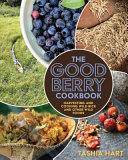
The Good Berry Cookbook
Explore the natural history, ecological contributions, and cultural significance of manoomin (wild rice), and savor complementary wild foods and local flavors with more than seventy-five inspired recipes, including favorites from over a dozen Indigenous cooks from various nations.
Manoomin, wild rice, also known as "the good berry," first drew the Anishinaabeg people to the Great Lakes region in search of the prophesied "food that grows on water." Honoring the sustenance they found in the place known as Mni Sota Makoce, The Good Berry Cookbook follows the Anishinaabeg through seasons and spaces to gather wild foods and contemplate connections among the people and their plant and animal relatives.
Ethnobotonist Tashia Hart takes us afield to marvel at the wonder of the northland's flora and to gather the bounty that translates in her kitchen--and yours--to inspired combinations like Bison and Sunchoke Quick Stew, Nutty Manoomin Patties with Ogaa (Walleye) Cheeks and Fiddlehead-Nettle Puree, and Sweet Potato Corn Pudding with Rose Sauce. Sweets are on the menu as well: Manoomin Chocolate Pie, Manoomin Smoothies, and Toasted Manoomin and Bagaan (Hazelnut) Butter Chocolate Cups.
These dishes are only the beginning: Hart shares foraging tips and basic preparations that equip home cooks to expand their repertoire. She invites other talented Native cooks and chefs to share favorite recipes. Through storytelling and science, she emphasizes food as medicine: good choices for our environment and good choices for our plate unite as we enjoy the benefits the good berry and its botanical neighbors have to offer. -
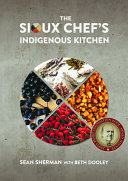
The Sioux Chef's Indigenous Kitchen
2018 James Beard Award Winner: Best American Cookbook
Named one of the Best Cookbooks of 2017 by NPR, The Village Voice, Smithsonian Magazine, UPROXX, New York Magazine, San Francisco Chronicle, Mpls. St. PaulMagazine and others
Here is real food--our indigenous American fruits and vegetables, the wild and foraged ingredients, game and fish. Locally sourced, seasonal, "clean" ingredients and nose-to-tail cooking are nothing new to Sean Sherman, the Oglala Lakota chef and founder of The Sioux Chef. In his breakout book, The Sioux Chef's Indigenous Kitchen, Sherman shares his approach to creating boldly seasoned foods that are vibrant, healthful, at once elegant and easy.Sherman dispels outdated notions of Native American fare--no fry bread or Indian tacos here--and no European staples such as wheat flour, dairy products, sugar, and domestic pork and beef. The Sioux Chef's healthful plates embrace venison and rabbit, river and lake trout, duck and quail, wild turkey, blueberries, sage, sumac, timpsula or wild turnip, plums, purslane, and abundant wildflowers. Contemporary and authentic, his dishes feature cedar braised bison, griddled wild rice cakes, amaranth crackers with smoked white bean paste, three sisters salad, deviled duck eggs, smoked turkey soup, dried meats, roasted corn sorbet, and hazelnut-maple bites.
The Sioux Chef's Indigenous Kitchen is a rich education and a delectable introduction to modern indigenous cuisine of the Dakota and Minnesota territories, with a vision and approach to food that travels well beyond those borders.
-
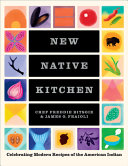
New Native Kitchen
Modern Indigenous cuisine from the renowned Native foods educator and former chef of Mitsitam Native Foods Café at the Smithsonian's National Museum of the American Indian
From Freddie Bitsoie, the former executive chef at Mitsitam Native Foods Café at the Smithsonian's National Museum of the American Indian, and James Beard Award-winning author James O. Fraioli, New Native Kitchen is a celebration of Indigenous cuisine. Accompanied by original artwork by Gabriella Trujillo and offering delicious dishes like Cherrystone Clam Soup from the Northeastern Wampanoag and Spice-Rubbed Pork Tenderloin from the Pueblo peoples, Bitsoie showcases the variety of flavor and culinary history on offer from coast to coast, providing modern interpretations of 100 recipes that have long fed this country.
Recipes like Chocolate Bison Chili, Prickly Pear Sweet Pork Chops, and Sumac Seared Trout with Onion and Bacon Sauce combine the old with the new, holding fast to traditions while also experimenting with modern methods. In this essential cookbook, Bitsoie shares his expertise and culinary insights into Native American cooking and suggests new approaches for every home cook. With recipes as varied as the peoples that inspired them, New Native Kitchen celebrates the Indigenous heritage of American cuisine.
-
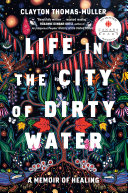
Life in the City of Dirty Water
*FINALIST FOR 2022 CANADA READS*
*SHORTLISTED FOR THE 2022 J.W. DAFOE BOOK PRIZE*
*SHORTLISTED FOR THE 2022 MANITOBA BOOK AWARDS’ MCNALLY ROBINSON BOOK OF THE YEAR AWARD*
NATIONAL BESTSELLER
A gritty and inspiring memoir from renowned Cree environmental activist Clayton Thomas-Muller, who escaped the world of drugs and gang life to take up the warrior’s fight against the assault on Indigenous peoples’ lands—and eventually the warrior’s spirituality.
There have been many Clayton Thomas-Mullers: The child who played with toy planes as an escape from domestic and sexual abuse, enduring the intergenerational trauma of Canada's residential school system; the angry youngster who defended himself with fists and sharp wit against racism and violence, at school and on the streets of Winnipeg and small-town British Columbia; the tough teenager who, at 17, managed a drug house run by members of his family, and slipped in and out of juvie, operating in a world of violence and pain.
But behind them all, there was another Clayton: the one who remained immersed in Cree spirituality, and who embraced the rituals and ways of thinking vital to his heritage; the one who reconnected with the land during summer visits to his great-grandparents' trapline in his home territory of Pukatawagan in northern Manitoba.
And it's this version of Clayton that ultimately triumphed, finding healing by directly facing the trauma that he shares with Indigenous peoples around the world. Now a leading organizer and activist on the frontlines of environmental resistance, Clayton brings his warrior spirit to the fight against the ongoing assault on Indigenous peoples' lands by Big Oil.
Tying together personal stories of survival that bring the realities of the First Nations of this land into sharp focus, and lessons learned from a career as a frontline activist committed to addressing environmental injustice at a global scale, Thomas-Muller offers a narrative and vision of healing and responsibility. -
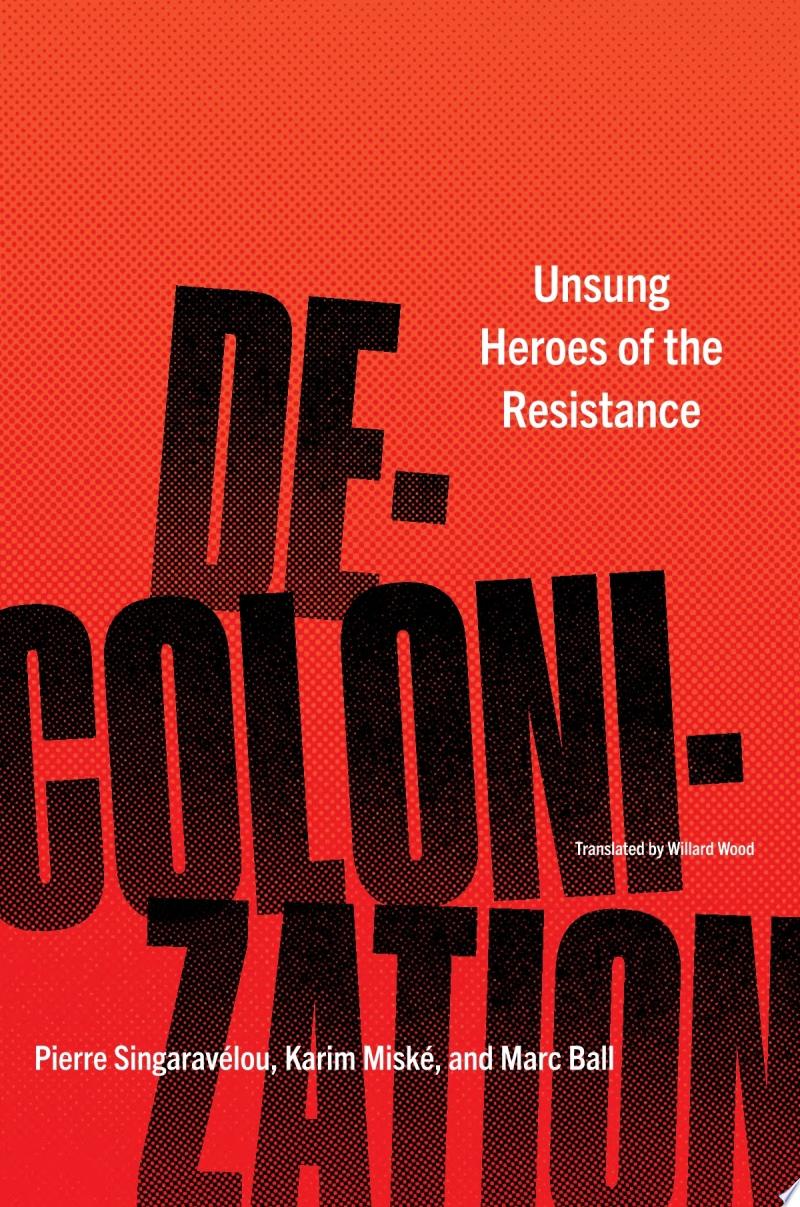
Decolonization
Full of gripping historical vignettes and evocative photographs, an accessible overview of the dynamic figures who resisted colonization, from India, Senegal, and Algeria to Vietnam, Kenya, and Congo.
Decolonization started on the very first day of colonization.
From the arrival of the Europeans, the peoples of Africa and Asia rose up. No one willingly accepts subjugation, but in order to one day regain freedom, you first and foremost need to stay alive. Faced with the Europeans’ machine guns, the colonized hit back in other ways: from civil disobedience to communist revolution, by way of soccer and literature. It was a struggle marked by infinite patience and unlimited determination, fought by heroic men and women now largely unknown.
Condensing a wealth of scholarly research into short, lively chapters, Decolonization brings their extraordinary stories to light:
Manikarnika Tambe, the Indian queen who led her troops into battle against the British;
Mary Nyanjiru, the Kenyan activist who spearheaded a protest in Nairobi;
Lamine Senghor, the Senegalese infantryman who became an anti-colonial militant in Paris;
and many more.
With them, a current of resistance swept the world, culminating in the independence of almost all the colonies in the 1960s. But at what price? In the atomic India of Indira Gandhi, in the Congo subjected to Mobutu’s dictatorship, or in a London shaken by the rioting of young immigrants, we can see just how crucial it is that we understand and learn from this painful history. -
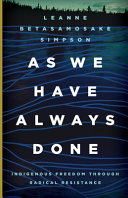
As We Have Always Done
Winner: Native American and Indigenous Studies Association's Best Subsequent Book 2017
Honorable Mention: Labriola Center American Indian National Book Award 2017
Across North America, Indigenous acts of resistance have in recent years opposed the removal of federal protections for forests and waterways in Indigenous lands, halted the expansion of tar sands extraction and the pipeline construction at Standing Rock, and demanded justice for murdered and missing Indigenous women. In As We Have Always Done, Leanne Betasamosake Simpson locates Indigenous political resurgence as a practice rooted in uniquely Indigenous theorizing, writing, organizing, and thinking.Indigenous resistance is a radical rejection of contemporary colonialism focused around the refusal of the dispossession of both Indigenous bodies and land. Simpson makes clear that its goal can no longer be cultural resurgence as a mechanism for inclusion in a multicultural mosaic. Instead, she calls for unapologetic, place-based Indigenous alternatives to the destructive logics of the settler colonial state, including heteropatriarchy, white supremacy, and capitalist exploitation.
-
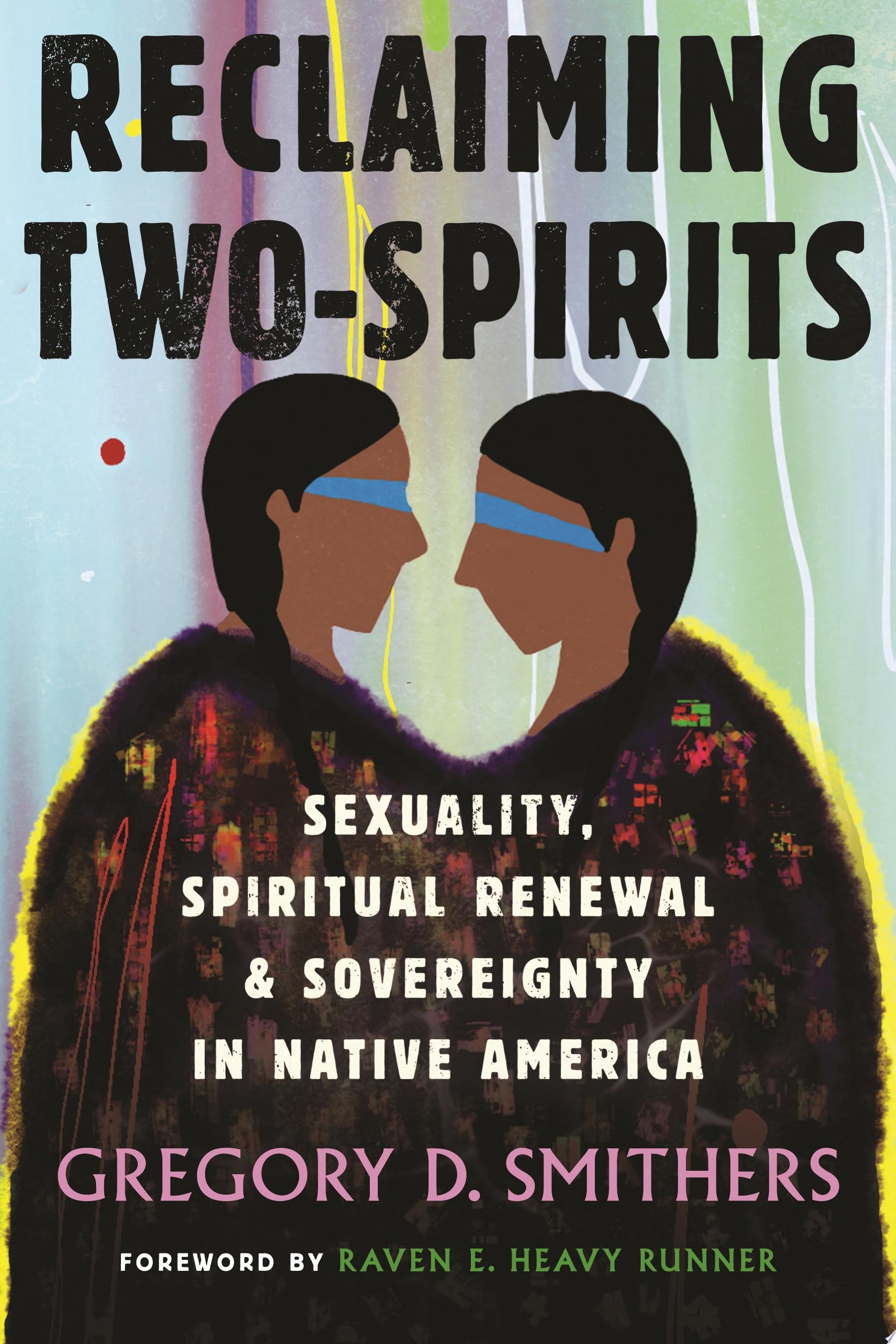
Reclaiming Two-Spirits
Winner of the 2023 Prose Award in Cultural Anthropology and SociologyFinalist for the 2023 Publishing Triangle Randy Shilts Award for Gay Nonfiction
A sweeping history of Indigenous traditions of gender, sexuality, and resistance that reveals how, despite centuries of colonialism, Two-Spirit people are reclaiming their place in Native nations.
Reclaiming Two-Spirits decolonizes the history of gender and sexuality in Native North America. It honors the generations of Indigenous people who had the foresight to take essential aspects of their cultural life and spiritual beliefs underground in order to save them.
Before 1492, hundreds of Indigenous communities across North America included people who identified as neither male nor female, but both. They went by aakíí’skassi, miati, okitcitakwe or one of hundreds of other tribally specific identities. After European colonizers invaded Indian Country, centuries of violence and systematic persecution followed, imperiling the existence of people who today call themselves Two-Spirits, an umbrella term denoting feminine and masculine qualities in one person.
Drawing on written sources, archaeological evidence, art, and oral storytelling, Reclaiming Two-Spirits spans the centuries from Spanish invasion to the present, tracing massacres and inquisitions and revealing how the authors of colonialism’s written archives used language to both denigrate and erase Two-Spirit people from history. But as Gregory Smithers shows, the colonizers failed—and Indigenous resistance is core to this story. Reclaiming Two-Spirits amplifies their voices, reconnecting their history to Native nations in the 21st century. -
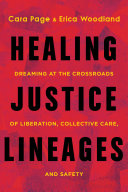
Healing Justice Lineages
A profound offering and call to action—collective stories, testimonials, and incantations for renewing political and spiritual liberation grounded in Black, Indigenous, People of Color, and Queer and Trans healing justice lineages
We reclaim the power, resilience, and innovation of our ancestors through this book. To embody their wisdom across centuries and generations is to continue their legacy of liberation and healing.
In this anthology, Black Queer Feminist editors Cara Page and Erica Woodland guide readers through the history, legacies, and liberatory practices of healing justice—a political strategy of collective care and safety that intervenes on generational trauma from systemic violence and oppression. They call forth the ancestral medicines and healing practices that have sustained communities who have survived genocide and oppression, while radically imagining what comes next.
Anti-capitalist, Black feminist, and abolitionist, Healing Justice Lineages is a profound and urgent call to embrace community and survivor-led care strategies as models that push beyond commodified self-care, the policing of the medical industrial complex, and the surveillance of the public health system. Centering disability, reproductive, environmental, and transformative justice and harm reduction, this collection elevates and archives an ongoing tradition of liberation and survival—one that has been largely left out of our history books, but continues to this day.
In the first section, “Past: Reckoning with Roots and Lineage,” Page and Woodland remember and reclaim generations-long healing justice and community care work, asking critical questions like: How did our ancestors transform trauma and violence in their liberation work? What were our ancestors reckoning with—and what did they imagine?
The next sections, “Origins of Healing Justice” and “Alchemy: Theory + Praxis,” explore regional stories of healing justice in response to the current political and cultural landscape. The last section, “Political + Spiritual Imperatives for the Future,” imagines a future rooted in lessons of the past; addresses the ways healing justice is being co-opted and commodified; and uplifts emergent work that’s building infrastructure for care, safety, healing, and political liberation.
